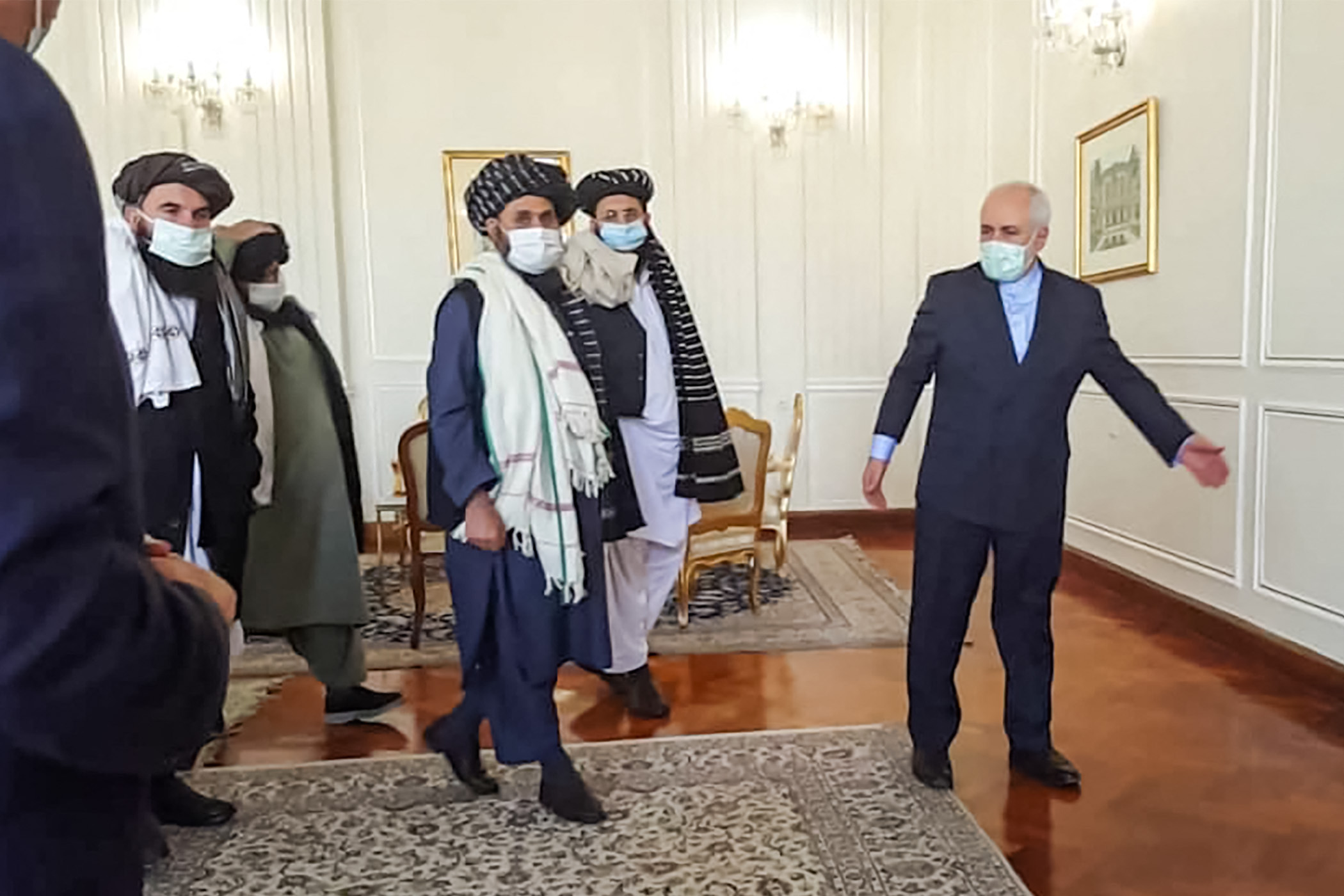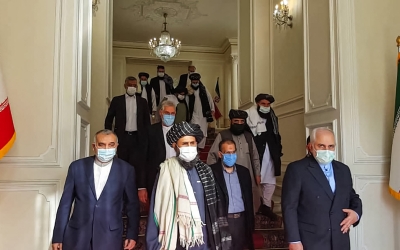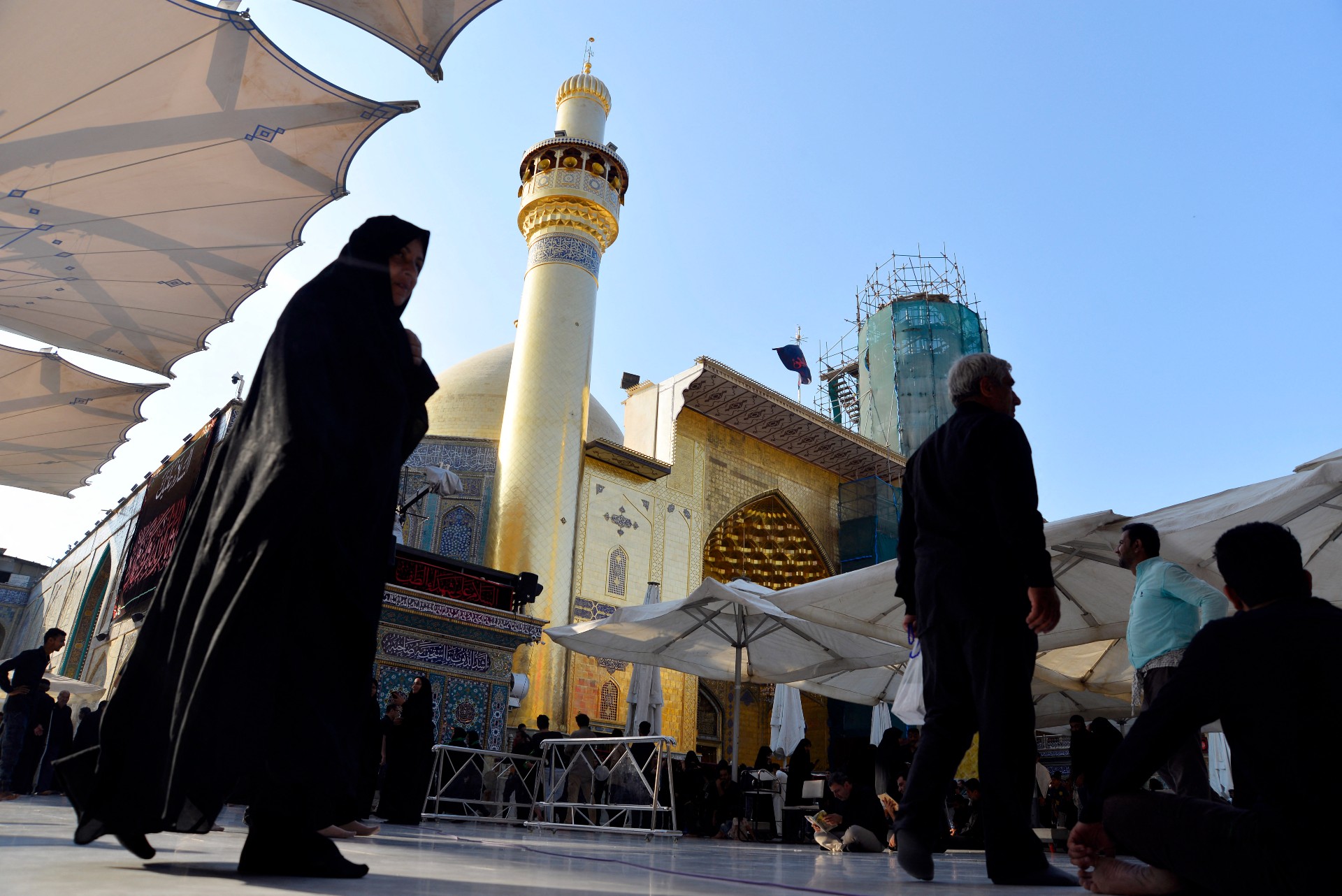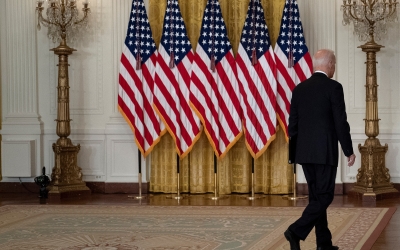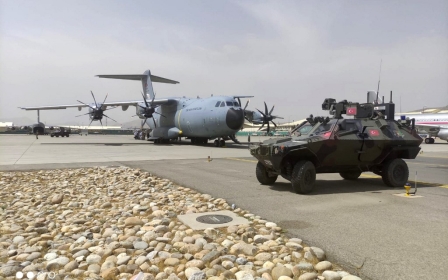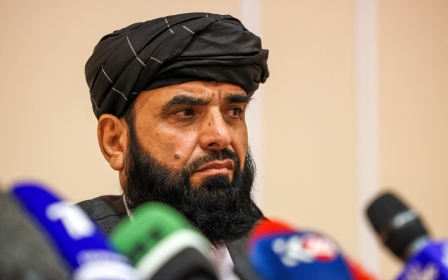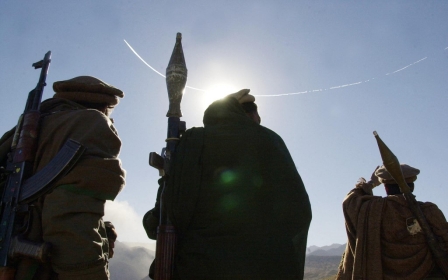Afghanistan: How Iran and its allies are relying on Soleimani's deals with the Taliban
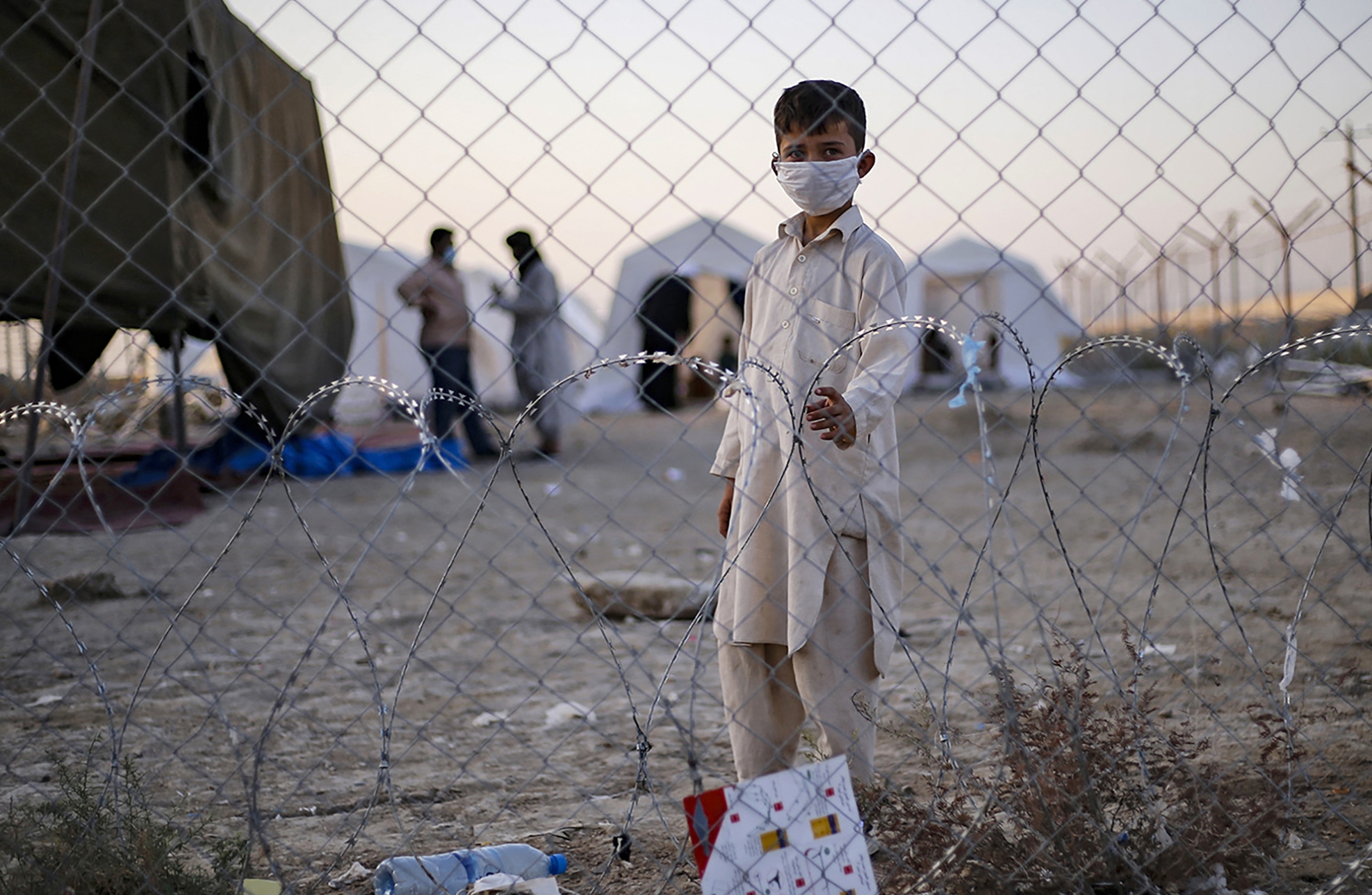
The response to the Taliban takeover was swift. Iranian-backed Iraqi paramilitaries early this week issued threatening statements, hinting they are prepared at any moment to travel to Afghanistan and protect Shia Afghans from the militant group.
Then, a couple of days later, they began to retract, and the temperature dialled down considerably.
Iraqi commanders, politicians and clerics told Middle East Eye that Iran gave its allied paramilitaries and political factions strict instructions: they are to have no role whatsoever in Afghanistan and must not interfere in any way under any pretext.
'The issue cannot be resolved militarily. The battle is lost and sending any Shia armed force there now means the extermination of the Shia community in Afghanistan'
- Senior Iraqi commander
The last time the Taliban was in control of Kabul, before 9/11 and the 2001 US invasion, the group was a fierce enemy of the Islamic Republic.
But things have changed in recent years, and Tehran now had no intention of letting hard-won and longstanding agreements with the Taliban be undermined, particularly now that the hardline Sunni group had seized complete control of Afghanistan and was preparing to reset relations across the region.
New MEE newsletter: Jerusalem Dispatch
Sign up to get the latest insights and analysis on Israel-Palestine, alongside Turkey Unpacked and other MEE newsletters
And though the Taliban’s true intentions towards Afghanistan's Shia remains to be seen, Iran is sending its allies the message that the persecutions of yesteryear will not be repeated – at least for now.
Following interviews with sources from Baghdad to Kabul, Middle East Eye can reveal:
- Iran has assurances from the Taliban that the Shia minority will be protected
- Qassem Soleimani personally struck deals with the Taliban in 2015
- Those deals included the Revolutionary Guard training and funding the group
- Tehran has promised to stop the Afghan Fatemiyoun Brigade from returning to Afghanistan
Iran's relationship with the Taliban stretches back decades and has vacillated between hostilities and alliance. Though the Taliban only emerged in 1994, its predecessors had enduring links with Afghanistan's neighbour to the west as well.
During the Soviet occupation of Afghanistan, the Iranians supported the Islamic Resistance Movement, later sending Revolutionary Guard officers over the border to train and advise Afghan Mujahedeen, some of whom would later join the Taliban.
Soleimani, the commander of Iran's elite overseas unit assassinated by the US last year, was among them until the end of the 1990s.
In 1998, the Iran-Taliban relationship completely dissolved, after the group was accused of murdering 10 Iranian diplomats and a journalist in Afghanistan.
'The Taliban will be patient and will show commitment to what they have agreed upon until they take control of all the provinces'
- Nasir Ahmad Hossaini,
university professor, Kabul
The Taliban's violent repression of Afghanistan's Shia minority, which today make up around 20 percent of the population, only soured relations further.
But in 2015, with an Islamic State group (IS) offshoot emerging in Afghanistan, a delegation of Taliban leaders visited Tehran to discuss opening a political office there, and a page began to be turned.
That year, Soleimani also visited Afghanistan, concluding several agreements with Taliban leaders, according to Iraqi commanders of Iranian-backed armed factions who were close to the general.
The agreements included many items. Most notable was preventing the establishment of US military bases near the Iranian border, stopping drug smuggling into the Gulf region through Iran, increasing and raising the level of attacks targeting US forces deployed in Afghanistan, and completely halting attacks against Shia Afghans.
In return, Iran promised to provide unlimited financial and technical support to the Taliban. It sent Revolutionary Guard officers to train and advise Taliban fighters, and allowed them to establish camps and safe havens for the group's leaders inside the Iranian border.
Tehran also promised to ensure that the Fatemiyoun Brigade, the fiercest Iranian-backed Afghan Shia militia, does not return to Afghanistan from Syria, the commanders told MEE.
"Since then, the Taliban has not targeted the Shia there, and all the attacks against them were carried out by ISIS," said a prominent commander of an armed faction who was very close to Soleimani.
Iranian media and people close to Iran that MEE spoke to claim that the majority of the Taliban are not hardline Sunni, but in fact Sufi, attempting to portray IS and al-Qaeda as the only extremists. The prominent commander, too, pushed this line, which is rejected by all Afghan sources.
"The majority of the Taliban are Sufis, and they have no ideological problem with the Shia, and they are the ones who made agreements with Soleimani," he said.
"The problem is with the Salafist Taliban. They joined al-Qaeda and ISIS and are responsible for most of the attacks against Shia over the past years."
'The Shia are now safe'
Until they were toppled by the US invasion in 2001, Taliban rule in Afghanistan was known for its exceptional brutality. Now they have retaken the country, there are widespread fears that human rights in the country will nosedive, and women, journalists, ethnic and religious minorities and anyone who worked with the West are now at risk.
The Hazara, the third-largest ethnic group in Afghanistan, represent the backbone of the Shia minority and are concentrated in the mountainous regions of central Afghanistan, especially in the provinces of Herat, Kabul, Bamiyan, Helmand, Ghazni and Mazar-i-Sharif.
The Taliban has always considered the Shia infidels and killed thousands of them over the past decades. The group's takeover sparked panic in Shia political and religious circles in Najaf and Baghdad last week.
Iranian-backed armed groups, feeling increasingly sidelined since the US began negotiating with Tehran on rejoining the nuclear deal, seized on the opportunity to place themselves in world events, vowing to protect the Shia.
Today, however, their media platforms perpetuate the idea that the Taliban has changed, moderated, and will not target Shia as it has done in the past. Instead, the media campaign insists, the Taliban takeover is a blatant defeat for the US and a victory for Islam.
"The Shia there are now safe from Taliban attacks. Iran has made several agreements with the Taliban years ago that include not attacking the Shia. And things are going according to these agreements, so far," a senior commander of an Iranian-backed armed faction told MEE.
"No Iraqi or non-Iraqi armed factions are allowed to interfere at this stage. The Iranians said this openly during our meeting with them a few days ago in Baghdad."
In that meeting, the Iranians outlined to their allies how the Shia villages are vulnerable, and the Taliban could swiftly "annihilate" them if Iran's agreement breaks down.
"The issue cannot be resolved militarily. The battle is lost, and sending any Shia armed force there now means the extermination of the Shia community in Afghanistan. This is what the Iranian leaders said in response to our questions," the commander said.
"[The commanders] who rushed to offer their services were unaware of what was going on, so they later remained silent.
"The orders are now to remain calm and wait, with the event being used in the media as an American defeat, and the lesson that America's agents and collaborators will pay the price when America leaves them and withdraws from Iraq soon.
"The message has arrived, and everyone inside Iraq has received it and understood it well."
Nervous calm
Since last week, the Taliban has sought to send messages of reassurance to Shia communities in the main cities in which they are based, especially Kabul, Mazar-i-Sharif, Ghazni and Kandahar.
Taliban leaders apologised to the Shia community after its fighters lowered Shia flags on Sunday. Some of the Taliban leaders were keen to visit Shia gatherings to reassure them and participate in the annual Ashura rituals.
On Thursday, Ashura commemorations in Afghanistan went ahead nervously but peacefully.
Mawlawi Najibullah, head of the Taliban's Daawa and Guidance Committee in Herat province, issued a written decision on Tuesday - a copy of which was obtained by MEE - banning harassment of Shia processions and mosques there.
Despite this, concern and nervousness prevails in the holy Iraqi city of Najaf, the centre of the Shia world and a place that hosts a large community of Afghans, most of whom are religious students.
'Our students told us that the Shia leaders there received guarantees from the Islamic Republic of Iran that the Taliban would not attack them in return for their commitment to calm and non-resistance'
- Sheikh Khaled al-Hamdani, seminary professor in Najaf
"We were very worried about our students and their families, especially in Kabul, Kandahar and Mazar-i-Sharif. We contacted the [religious] schools office in Kandahar and the marjiya [clergymen] offices in the rest of the cities. They told us that there are no problems so far and that life is normal," Sheikh Khaled al-Hamdani, a seminary professor in Najaf in charge of foreign students, told MEE.
"Our students told us that the Shia leaders there received guarantees from the Islamic Republic of Iran that the Taliban would not attack them in return for their commitment to calm and non-resistance."
In Mazar-i-Sharif, Taliban fighters entered the province in accordance with an agreement supervised by Iran, sources told MEE.
Iran ordered fighters from the Hazara al-Wahdat Party, who were part of the official Afghan counterterror forces, to withdraw in favour of the Taliban, keeping their weapons until further notice, according to sources in Najaf and Kabul.
"The Iranians fear that the conflict will take an ethnic turn, and then it will be bloodier than the sectarian one," Hamdani said.
There are concerns that if an ethnic conflict is stoked with the Hazara, other groups in Afghanistan would turn on the Shia, not just the Taliban.
"The Taliban do not consider the Hazara to be indigenous to the country and question their origins. If the conflict turns from sectarian to ethnic, it means the end of the Hazara," Hamdani said.
Calls for Sistani to intervene
Things in Najaf are tense, and Grand Ayatollah Ali al-Sistani, the leader of the Shia community, is watching Afghanistan closely.
Sistani has the clout to mobilise Shia at any moment, as he did when IS tore through Iraq in 2014, but is not likely to interfere in any way as things stand, researchers, leaders of Iranian-backed armed factions and clerics close to the ayatollah told MEE.
"Some people were asking marjiya [clergymen] in Najaf, especially Mr Sistani, to intervene and issue a fatwa on jihad or invest his global reputation to defend the Shia minority in Afghanistan," Ali al-Madan, an Iraqi researcher specialising in religious thought and political Islam movements, said.
"It is not likely that he will respond. Such behaviour will not come from Sistani. He calculates that the Shia there are outnumbered by other sects and ethnicities, and they lack the capabilities to fight."
Madan noted too that Sistani has built his reputation on calls for pluralism, tolerance and peaceful coexistence between religions and sects, and this would be questioned if he interferes to defend Shia alone.
"I believe that he will invest his reputation for a loftier and greater goal and will call for concerted international efforts to protect all Afghans and guarantee their rights," he said.
True face
During the Ashura commemorations this week, Afghan students in Najaf have made anxious calls to their relatives in Kabul, Mazar-i-Sharif, Bamiyan and Helmand, who reassured them that so far the situation remains relatively calm and the Shia rituals have been allowed to go ahead in peace.
"Everyone there agreed not to clash with the Taliban fighters and to wait for the formation of a new government, which will include representatives of the Shia," one student told MEE.
Yet Iraqi armed faction commanders warned that this calm is contingent on the Taliban's ability to control its fighters.
The Taliban's leaders have made pains to project an image that the group is much more tolerant and inclusive than it was previously. However, already reports are emerging that its fighters are carrying out purges and targeting women, journalists and people associated with the West.
On Wednesday, at least three people were killed and dozens were wounded in the city of Jalalabad, 150km east of Kabul, when Taliban militants fired on residents protesting against the group removing the national flag, eyewitnesses said.
Hours later, Taliban militants blew up the statue of the slain Hazara leader Abdul Ali Mazari, who fought the Taliban in the 1990s, an eyewitness told MEE by phone. Mazari was killed by the Taliban in 1995 along with a number of his comrades after they were kidnapped and tortured.
Meanwhile, on Friday Amnesty International revealed that Taliban fighters massacred nine Hazara men on 4-6 July in Ghazni province.
Afghan and Iraqi researchers and armed factions commanders say they believe the Taliban will not be able to pretend for long that it can adopt behaviour that is incompatible with its ideology, and it is only a matter of time before it shows its true face.
"The Taliban will be patient and will show commitment to what they have agreed upon until they take control of all the provinces," Nasir Ahmad Hossaini, a university professor, told MEE from Kabul.
“Maybe they will change their policy after that. It's only a matter of time."
This article is available in French on Middle East Eye French edition.
Middle East Eye delivers independent and unrivalled coverage and analysis of the Middle East, North Africa and beyond. To learn more about republishing this content and the associated fees, please fill out this form. More about MEE can be found here.


